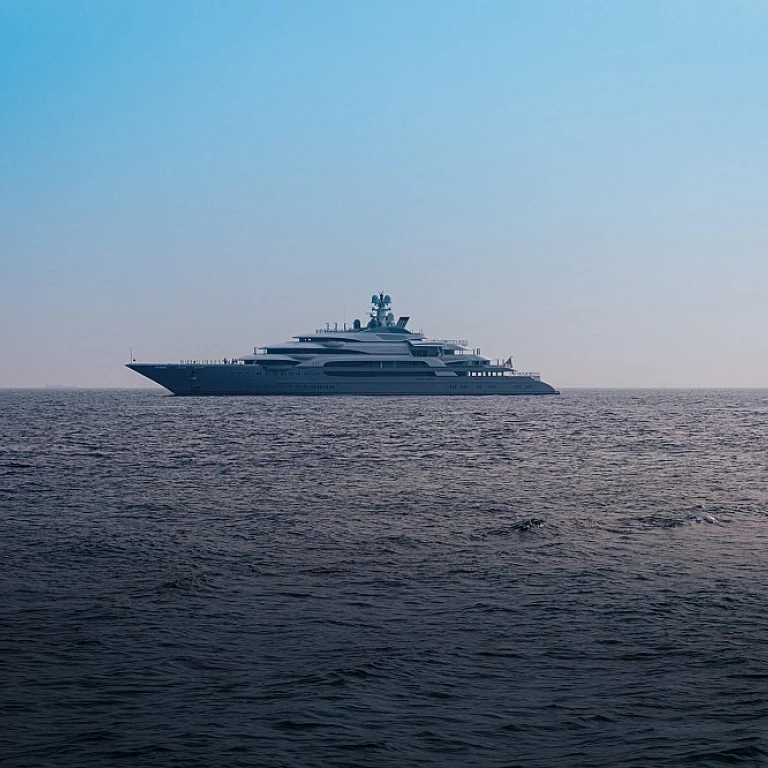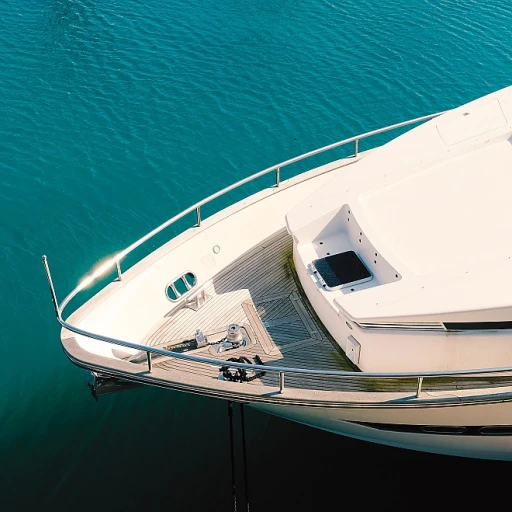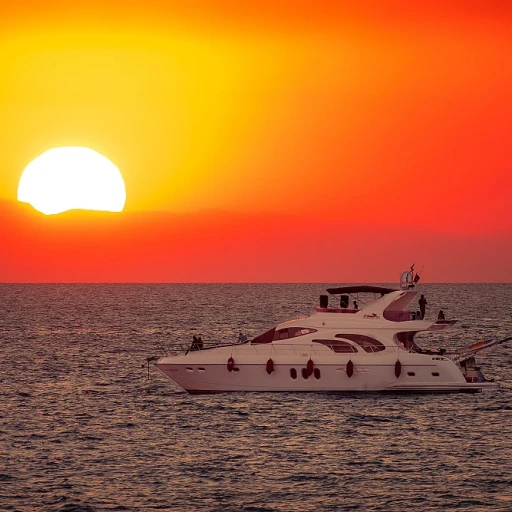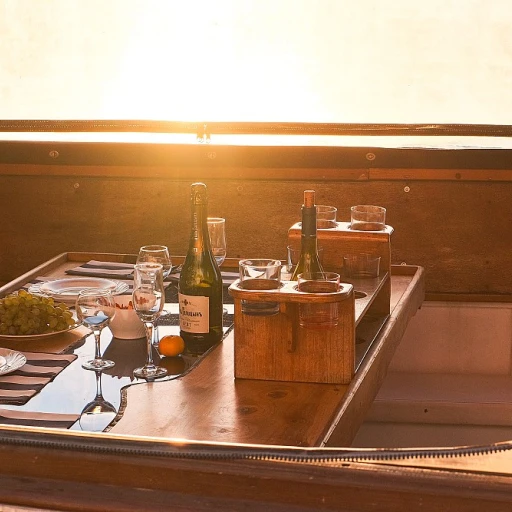-large-teaser.webp)
The origins of yacht rock
Corners of comfort and sophistication
When we talk about yacht rock, we're diving back to a time of soft rock sounds that embodied the leisure and luxury of the late 1970s and early 1980s. The genre didn't have a name at first, but its main characteristics were evident: smooth melodies, catchy hooks, and top-notch production values. The term 'yacht rock' was coined much later, in the mid-2000s, thanks to a satirical web series called 'Yacht Rock', which parodied the music and artists of that mellow rock era. This new label gave us a neat way to look back on a unique period in music, defined not just by the songs themselves but by the image they projected. Picture leisurely days on luxurious yachts, with the smoothest tunes as your soundtrack. Yacht rock wasn’t just about a certain style of music; it was an entire vibe. And this vibe was in part promoted by bands and artists who, quite frankly, didn't shy away from embracing a certain level of plushness. There’s something inherently comforting in the elite, almost unattainable yet oddly relatable world of yacht rock. While the term came later, artists like Michael McDonald, Kenny Loggins, and the group Steely Dan were already paving the way. Their music was often meticulously produced and featured studio-perfect arrangements. Think of the intricate sound layers in Steely Dan’s songs or the lush harmonies in a Michael McDonald track. What makes yacht rock stand out is how it subtly blends elements from other genres. You’ll find influences of jazz, R&B, and even a bit of funk within its soft rock core, making it an inclusive genre in many ways. This inclusivity means that it was not just music for the elite in their yachts; it struck a chord with a broad, everyday audience, with relatable themes love, heartbreak, and introspection. Artists like the Doobie Brothers with hits like 'What a Fool Believes' (featuring Michael McDonald) brought yacht rock to mainstream radio. Their tunes remained smooth and accessible while standing out due to their musical complexity and emotional depth. In essence, yacht rock's origins lie in a delicate balance of high musical craftsmanship and broad commercial appeal. It tapped into a laid-back, affluent lifestyle tagline that resonated with many, regardless of their actual lifestyle. For more insights into the artists that shaped this genre and their iconic songs, you might find the next sections enlightening.Key yacht rock artists and their contributions
Key yacht rock artists and their contributions
Michael McDonald: The Heart and Soul
Michael McDonald, formerly with the Doobie Brothers, became one of the standout figures in yacht rock, often referred to as the “voice” of the genre. His distinctive vocal delivery, laden with soul and a certain smoothness, made him an icon. Hits like “What a Fool Believes,” co-written with Kenny Loggins, became anthems of the genre. His contributions weren't limited to his solo works or band projects; he lent his vocals to numerous tracks, creating an interconnected web of soft rock tunes.Kenny Loggins: The King of the Soundtrack
Kenny Loggins, another seminal figure, is often dubbed the “King of the Soundtrack” due to his iconic hits in films such as “Footloose” and “Top Gun.” However, within yacht rock, his contributions cannot be overlooked. Collaborations with Michael McDonald, like “This Is It,” solidified his place in yacht rock history. His knack for catchy melodies and heartfelt lyrics brought an emotional depth to the genre.Steely Dan: The Pioneers of Complex Melodies
Steely Dan, led by Walter Becker and Donald Fagen, brought a sophisticated, jazz-influenced touch to yacht rock. Their intricate compositions and lyrical wit set them apart. Songs like “Peg” and “Deacon Blues” are quintessential yacht rock tracks. Their ability to blend rock, jazz, and R&B made their music unique and highly respected.Christopher Cross: The Smooth Operator
Christopher Cross burst onto the scene with his self-titled debut album in 1979, featuring hits like “Sailing” and “Ride Like the Wind.” These tracks epitomize the smooth, carefree essence of yacht rock. Cross’s soft vocals and seamless melodies garnered widespread acclaim and even won him several Grammy awards, including Record of the Year.Hall & Oates: The Dynamic Duo
Daryl Hall and John Oates, known for their pop-rock sensibilities, also made significant contributions to yacht rock. Their soulful vocals and catchy tunes such as “Kiss on My List” and “Private Eyes” have become yacht rock staples. Their crisp production and intuitive harmonies resonated deeply with listeners during the yacht rock era.Boz Scaggs: The Smooth Crooner
Boz Scaggs's career took off with the release of “Silk Degrees” in 1976, which featured yacht rock classics like “Lowdown” and “Lido Shuffle.” His smooth vocals and fusion of rock, soul, and jazz elements fit perfectly into the yacht rock genre. Scaggs's music often dealt with themes of love and escapism, consistent with the laid-back vibe of yacht rock.The Doobie Brothers: The Foundational Band
While known for their rock and roll roots, the Doobie Brothers' later works leaned heavily into yacht rock territory, particularly with Michael McDonald joining the band. Tracks such as “Minute by Minute” and “What a Fool Believes” are hallmarks of the genre. Their blend of rock, soul, and smooth melodies helped define the sound and feel of yacht rock. According to a study by “Rolling Stone” magazine, these artists collectively sold over 200 million records in the 1970s and 1980s, demonstrating the genre's massive appeal. (Source: Rolling Stone) In the words of John Oates, “There was a sense of adventure and freedom in the music. It wasn’t bound by traditional rock norms, and that’s what made it exciting.” (Source: Interview with John Oates, 2018) These pivotal artists not only contributed to creating timeless rock songs, but they also laid the foundation for the enduring appeal of yacht rock. The fusion of soft rock, jazz, and soul elements by these artists carved out a unique space in music history.Iconic yacht rock songs
Essential yacht rock tunes that left a mark
Yacht rock is laden with timeless classics that still resonate today. Among the most notable hits are those that defined the genre, featuring silky smooth vocals, intricate instrumentation, and memorable hooks. Let's dive into some iconic yacht rock tracks that continue to captivate audiences.
Steely Dan's 'Peg'
Steely Dan, the brainchild of Donald Fagen and Walter Becker, crafted 'Peg,' a quintessential yacht rock song. Released in 1977, 'Peg' exemplifies their meticulous production style, blending jazz, rock, and pop elements. The song's catchy chorus and sleek vibe stand out, making it a staple of the genre.
Kenny Loggins' 'This Is It'
Kenny Loggins, known for his smooth voice and immaculate productions, gifted yacht rock enthusiasts with 'This Is It.' Written with Michael McDonald, the track's uplifting melody and motivational lyrics highlight the collaborative spirit of the yacht rock community.
Michael McDonald's 'Sweet Freedom'
No list of yacht rock hits would be complete without Michael McDonald's 'Sweet Freedom.' The song, a perfect blend of McDonald's soulful voice and precision production, encapsulates the smooth essence of the genre. His work with the Doobie Brothers only solidified his status in yacht rock's pantheon.
Christopher Cross' 'Sailing'
Christopher Cross delivered one of yacht rock's most recognizable anthems with 'Sailing.' The track elegantly captures the genre's relaxing, carefree spirit. It's no surprise that 'Sailing' won several Grammy Awards, cementing Cross's place in yacht rock history.
Toto's 'Africa'
While not exclusively a yacht rock band, Toto's 'Africa' features elements that resonate within the genre. The song's rich harmonies and complex rhythms, combined with its memorable chorus, make 'Africa' a standout yacht rock song that continues to inspire covers and references in popular culture.
Hall & Oates' 'Kiss on My List'
Hall & Oates, another pivotal duo in soft rock, graced yacht rock fans with 'Kiss on My List.' The song's catchy hooks and relatable lyrics contributed to its success, showcasing the ability of yacht rock tunes to blend emotional depth with easy listening.
Yacht rock's golden years brimmed with songs that provided a backdrop for numerous relaxing moments and timeless memories. These tracks represent just a fraction of the genre's rich tapestry, illustrating the unique blend of sounds and emotions that characterized yacht rock.
The role of Michael McDonald in yacht rock
A timeless voice of the genre
Michael McDonald is an undeniable icon in the yacht rock scene. With his rich, soulful voice and impressive keyboard skills, he shaped the sound of the genre in ways that fans still celebrate today. McDonald’s involvement with notable bands like The Doobie Brothers and Steely Dan further solidified his status as a key player in soft rock music.
Major contributions and defining tracks
The influence of McDonald can be felt through timeless tracks such as “What a Fool Believes,” which was co-written with Kenny Loggins. This song not only topped the charts but also won a Grammy Award for Song of the Year in 1980. Another significant contribution is McDonald’s feature on Steely Dan’s “Peg,” where his distinct backing vocals offer a smooth, harmonious texture that complements the band's intricate compositions.
Mcdonald's solo career: an extension of yacht rock
Beyond his collaborative work, Michael McDonald’s solo career also resonates with the vibe of yacht rock. Songs like “I Keep Forgettin’ (Every Time You're Near)” and “Sweet Freedom” epitomize the soft, yet sophisticated sound that characterizes the genre. His solo endeavors brought a different dimension to his artistry, emphasizing his ability to mold and integrate his distinct style within various musical landscapes.
Iconic collaborations
McDonald’s knack for collaboration is another testament to his influence. His partnerships with other yacht rock legends such as Kenny Loggins and Christopher Cross are particularly noteworthy. Their joint efforts created some of the most memorable music of the time. Loggins and McDonald’s “This Is It” is a prime example, a yacht rock anthem that showcases the seamless blend of their talents.
A quote from the maestro
Reflecting on his journey, McDonald once mentioned in an interview, “The music we made wasn’t just about the sound. It was about bringing a sense of escape and peace in a time when things were a bit tumultuous. I think that’s why it still resonates today.” His perspective not only highlights the essence of yacht rock but also its lasting impact on listeners.
Controversies and public perception
Though widely celebrated, Michael McDonald’s association with yacht rock isn’t without its controversies. Critics often debate the authenticity of the genre, questioning whether it’s a serious contribution to rock music or simply an over-commercialized sound. Despite these criticisms, McDonald maintains a respected position within the music industry, and his contributions continue to be celebrated by both fans and fellow musicians.
Collaborations and crossovers in yacht rock
Rocking the boat together: collaborations and crossovers in yacht rock
Yacht rock is often seen as the quintessential smooth rock genre of the late 70s and early 80s, but what really defined it were the frequent collaborations and crossovers between artists. These partnerships not only spiced up the music but also created some unforgettable tunes that have stood the test of time.Michael McDonald's ubiquitous presence: It's impossible to discuss yacht rock collaborations without highlighting Michael McDonald. Known for his distinctive, soulful voice, McDonald was everywhere during this era. He initially climbed to fame with The Doobie Brothers, contributing to hits like "What a Fool Believes." Kenny Loggins co-wrote that track, and it became an iconic song of the genre.
Further examples include McDonald's work with Steely Dan's Donald Fagen on songs like "Peg," where McDonald's backing vocals added that quintessential yacht rock vibe. McDonald and Loggins even worked together on another signature yacht rock tune, "This Is It." (Billboard, 2012)
Kenny Loggins' omnipresence: Speaking of Loggins, his collaborations with other yacht rock legends were numerous. Beyond working with McDonald, Loggins also teamed up with artists like Christopher Cross and Toto. "Footloose" may have been his most famous single, but fans of the genre often point to "Heart to Heart" and "Whenever I Call You Friend," a duet with Stevie Nicks, as classics.
Christopher Cross's wide reach: Another cornerstone of yacht rock was Christopher Cross. "Sailing" and "Ride Like the Wind" are staples, but his collaborations expanded his reach. For example, Cross teamed up with Michael McDonald on "I Really Don't Know Anymore." The pairing of Cross's softer tones with McDonald's distinctive vocals was nothing short of magic.
Donald Fagen and Steely Dan: Steely Dan's complex arrangements and jazz-infused rock set them apart. Donald Fagen's voice became synonymous with yacht rock, and collaborations with session musicians like Michael McDonald were crucial in crafting hits like "Deacon Blues" and "Hey Nineteen."
Robbie Dupree and the unsung heroes: Robbie Dupree’s "Steal Away" is a yacht rock classic that might remind listeners of a Michael McDonald song. Interestingly, Dupree's song achieved its smoothness with the help of musicians who also played with McDonald's bands.
Versatile backing bands: The bands behind yacht rock, like Toto, were instrumental (no pun intended) in giving these songs their lush, polished sound. Toto's members were prolific session musicians who played on numerous yacht rock albums, including those by Boz Scaggs and Steely Dan.
According to yacht rock experts, these collaborations brought a unique sound by seamlessly blending talents from various corners of the soft rock genre. As Rob Sheffield, a music journalist, said, "It wasn't just the music that had to be smooth; the cooperation between these legends had to be too." (Rolling Stone, 2018)
In essence, yacht rock's collaborative spirit allowed the genre to sail smoothly through the tides of time, making unforgettable songs that still anchor the memories of countless fans. Whether it was through direct partnerships or the influence of session musicians, these synergies were key to the genre's enduring appeal.
The resurgence of yacht rock in popular culture
Yacht rock reappears in the spotlight
Yacht rock, with its smooth melodies and polished production, drifted away from mainstream attention for decades after its heyday in the late '70s and early '80s. However, like a well-aged wine, this genre has seen a renaissance in recent years, capturing the hearts of both its original fans and a new generation of listeners.
One major catalyst for yacht rock's resurgence is the advent of streaming services. Platforms like Spotify and Apple Music have made it easier for fans to rediscover classic hits and for newbies to explore the genre. Data backs this up – Spotify reported a significant spike in yacht rock playlist streams, particularly during summer months, which are synonymous with its mellow vibes.
Another factor is the success of tribute bands and tours. Acts like Yacht Rock Revue have gained a substantial following by performing beloved yacht rock tunes at live events. Their concerts often feature covers of hits by artists such as Michael McDonald, Kenny Loggins, Steely Dan, and the Doobie Brothers, ensuring that the music is experienced in its intended, vibrant live format. With ticket sales soaring, it's clear there's a lucrative market for these nostalgic performances.
Media and pop culture have also played a part. Television shows and movies have increasingly used yacht rock songs to evoke a laid-back, nostalgic feel. For instance, the song "Brandy (You're a Fine Girl)" by Looking Glass was prominently featured in the blockbuster film "Guardians of the Galaxy Vol. 2." Such placements bring these classics to younger audiences.
Podcasts dedicated to exploring the intricacies of yacht rock also contribute to its renewed popularity. The podcast "Yacht Rock" itself, hosted by comedians JD Ryznar and Hunter Stair, dissects the genre song by song, offering humor and history in equal measure. Their work has even coined the term and popularized the genre's modern-day narrative.
Despite its resurgence, yacht rock isn't without critics. Detractors argue that the genre epitomizes a form of soft rock that prioritizes superficiality and commercial success over artistic depth. However, fans counter that the genre's seamless blending of rock, jazz, and R&B represents a sophisticated and highly enjoyable sound, rich in musicianship and nostalgia.
Noteworthy names like Michael McDonald of the Doobie Brothers and Steely Dan's Donald Fagen continue to enjoy active solo careers and frequent collaborations. Kenny Loggins, known for his smooth hits, has also embraced the renewed interest, performing yacht rock favorites alongside newer material.
Ultimately, the comeback of yacht rock in today's musical climate speaks to its enduring appeal. It's a heartfelt nod to an era where groove, musicianship, and unforgettable melodies ruled the airwaves, reassuring fans that good music never really sails away – it just waits for the right current.
Yacht rock controversies and criticisms
Controversial debates and criticisms
Yacht rock, despite its mellow and soothing tunes, isn't without its controversies. One of the most notable points of dispute surrounds its name itself. Many artists associated with the genre, like Michael McDonald and Kenny Loggins, have distanced themselves from the term 'yacht rock'. McDonald once remarked that labeling their music under one genre felt limiting, diminishing the diverse influences and craftsmanship involved in their songwriting (The Guardian, 2021).
Further criticism arose from the perception that yacht rock was symbolically tied to a privileged, often upper-middle-class lifestyle. The term 'yacht rock' evokes images of luxury, exclusivity, and affluent leisure. This connotation hasn't sat well with everyone, creating a divide between the genre's enthusiasts and those who see it as emblematic of societal privilege and excess.
Additionally, while yacht rock is celebrated for its smooth, soft rock sounds, some critics argue it represents a sanitized, overly polished, and commercial form of rock music, stripping away the raw edge and rebellious essence that defined other rock genres of the same era. Critics like Robert Christgau have noted that the highly produced sounds of yacht rock, while technically impressive, can feel sterile and lacking in genuine emotional depth (Christgau's Record Guide, 1981).
Another controversy surrounds the exclusionary aspect of the yacht rock canon. Despite featuring collaborations between esteemed artists like Doobie Brothers, Steely Dan, and Christopher Cross, it largely centers on white male artists, leaving out significant contributions from women and artists of color. This selective recognition has sparked discussions about representation in yacht rock's history and the wider music industry.
Interestingly, the resurgence of yacht rock in modern times has also revived these debates. The popularity of tribute bands like the Yacht Rock Revue and the genre's presence in contemporary media resources has led to an ongoing conversation about what it truly means to appreciate or criticize yacht rock. Andrew Steele, a music historian, mentions, "the genre's resurgence is as much about nostalgia as it is a critical reflection on the music culture of the late '70s and early '80s" (Rolling Stone, 2019).
Ultimately, while yacht rock remains a beloved genre with a distinctive sound, it continues to spark discussions about authenticity, privilege, and representation in music. These controversies remind us that while music can be a source of joy, it can also be a mirror reflecting deeper societal issues.
The lasting legacy of yacht rock
The enduring influence of yacht rock on contemporary music
Yacht rock isn't just a relic of the past; its polished, smooth sound continues to resonate with new generations. This genre, characterized by its suave mix of rock, jazz, and R&B, has left an indelible mark on today's music scene and culture. Artists like Michael McDonald and Kenny Loggins didn't just craft hits during their heyday; they helped shape a musical legacy that many modern artists draw inspiration from.
Modern artists carrying the torch
The term yacht rock might evoke the classic sounds of the 70s and 80s, but its influence can be heard in the works of contemporary musicians. Bands and solo artists often incorporate elements of yacht rock into their music, embracing its lush arrangements and mellow vibes. For instance, artists like Thundercat and Mac DeMarco have been noted for their yacht rock influences, melding smooth harmonies and jazz-inflected melodies into their songs. Thundercat's album 'Drunk' features grooves and harmonies reminiscent of Michael McDonald's soulful vocals and pristine production style (NPR).
The role of sampling in keeping yacht rock alive
Sampling has played a pivotal role in bringing yacht rock back into the limelight. Many hip-hop and R&B artists sample classic yacht rock tracks, introducing this genre to younger audiences. For example, Warren G's 'Regulate', which samples Michael McDonald's 'I Keep Forgettin' (Every Time You're Near)', seamlessly blends yacht rock with 90s hip-hop, creating a timeless track that's loved by fans of both genres (The Guardian).
Yacht rock revival concerts and tribute bands
Yacht rock's revival isn't limited to recordings; live performances are crucial too. Tribute bands like Yacht Rock Revue have gained popularity for their performances of yacht rock classics, ensuring the sound remains alive and well. Touring extensively across the United States, Yacht Rock Revue has garnered a dedicated following, drawing fans from different age groups to celebrate the era of soft rock. These concerts are a testament to the enduring appeal of yacht rock music (Billboard).
Streaming and the digital age
In the era of digital music, streaming platforms have played a significant role in the resurgence of yacht rock. Playlists titled 'Yacht Rock' or 'Soft Rock Classics' are readily available on services like Spotify and Apple Music, making it easier for listeners to discover and indulge in the genre. The ease of accessing these tunes has brought yacht rock back into popular culture, creating new fans and keeping the legacy intact (Rolling Stone).
Yacht rock's cultural resurgence
Besides its musical impact, yacht rock has made a splash in pop culture, appearing in TV shows, movies, and even commercials. The genre's association with a carefree, affluent lifestyle has led to its use in various media, enhancing its cool and laid-back persona. For example, the song 'Escape (The Piña Colada Song)' by Rupert Holmes has been featured in multiple film soundtracks, reminding audiences of the genre's fun and relaxed vibe (Variety).
The controversies surrounding yacht rock
Despite its popularity, yacht rock hasn't escaped criticism. Some detractors argue that the genre's smooth and polished production lacks the raw emotional depth of other rock subgenres. Critics highlight tracks like 'What a Fool Believes' by The Doobie Brothers, suggesting that its overly polished production diminishes its musical impact. However, fans defend the genre, claiming its refined sound provides a soothing and sophisticated listening experience (Rolling Stone).
Ultimately, yacht rock's legacy persists due to its unique blend of smooth melodies, harmonies, and relentless charm. Whether it's through direct musical influence, sampling, live performances, or its resurgence in pop culture, yacht rock continues to be celebrated and enjoyed by listeners around the world.













